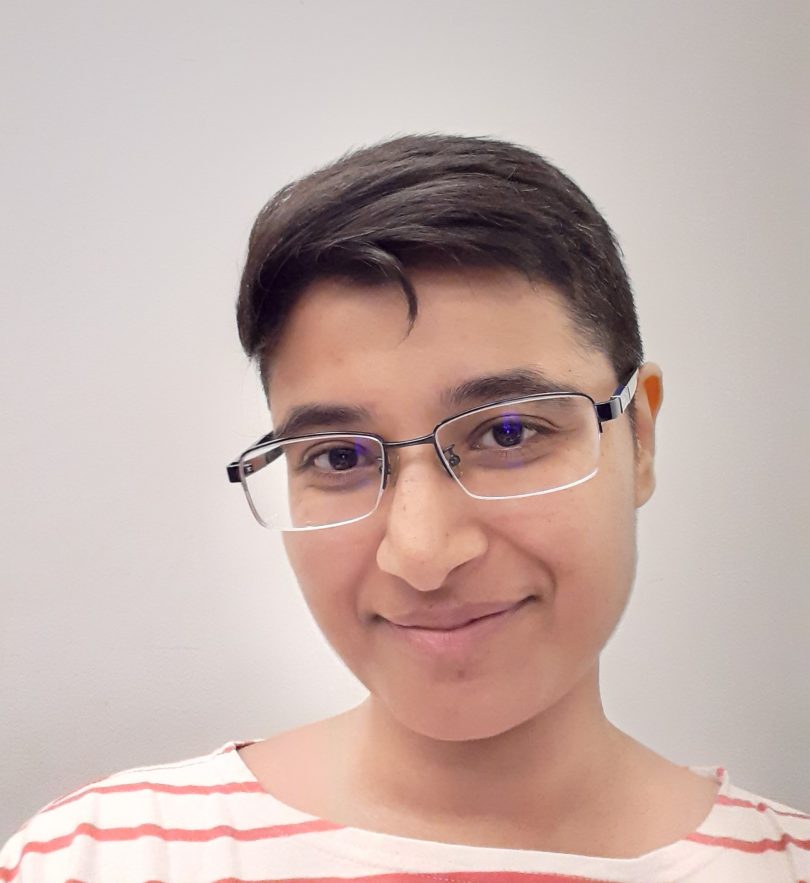Interview with Naveen Minai
As we are set to begin another school year, we bring you an interview with Naveen Minai, who will be teaching a number of courses for us this year!
1. After teaching a few courses for us, you’ll be joining us as an assistant professor this year, how does that feel?
It feels wonderful! I am so excited and pleased to join SDS faculty, staff, and students in this capacity. I think SDS provides a frame and space of collectivity and community, shared spaces and goals, and a sense of possibility. There is energy, commitment, and vision towards intellectual and relational generosity, intellectual creativity and integrity, and a praxis based in feminist queer and trans of color ethics and experiences. The courses I have taught so far have provided an opportunity for me to get to know SDS students, staff, and faculty and I have been delighted and impressed by the imagination, thoughtfulness, and energy of the undergraduate students in particular. I am looking forward to contributing to, and participating in, the collective and shared visions, spaces, and work that are being created in SDS by these communities.
2. Over the summer, you taught “Transnational Queer Media” online. How did you adapt to this format?
I designed this course to be taught online of course due to the global pandemic. The first element I adapted for this format and the conditions that have necessitated it were the course goals, which were: fun, distraction, process, and practice/inquiry. I chose these goals in part because of the conditions students have found themselves dealing with right now. The other reasons were to make us think in more thoughtful and careful ways about the media(ted) worlds around us within which we are located, and to think more about what we mean when we use words such as queer and transnational. To become more thoughtful and careful is a process and requires practice. To become more thoughtful and careful can be a fun process –and let’s be real, we could do with a distraction right now! I adapted coursework to be based on reflection and analysis on the same media texts that each student chose themselves so that there was a continuous and process-based engagement with thinking about a text. I also experimented with what I called a digital workshop which required students to provide supportive and generative comments and questions to each other for their work. The purpose was to start conversations among students and to provide intellectual support and encouragement for one another rather than have students only interact with myself as an instructor because I wanted to emphasize support and generosity rather than assessment. The biggest adaptation for the digital format was that students were not required to attend class sessions on Zoom which I decided to do because I wanted to respect the multiple difficulties each student is dealing with right now, including international time zones, moving and/or being relocated outside of Toronto, issues of privacy in changed domestic spaces, and added or new responsibilities of care and work. I learned a lot from my students both during the course and through their feedback afterwards about how to adapt more effectively to online teaching and learning, and I am definitely going to use those lessons for the upcoming Fall 2020 and Winter 2021 semesters.
3. You’ll be teaching “Sexuality at the Intersections,” “Queer Pop Culture,” “Queer Migrations and Refugee Politics,” and “Queer of Colour Critique” for us, which covers a wide range of topics. Is there anything you hope to emphasize to your students across your courses?
I hope to emphasize three things across my courses. First, a careful, attentive, generous practice of reading that frames reading as a conversation rather than a competition, as a matter of openness rather than mastery. Second, a thoughtful, responsible practice of writing that focuses on thoughtfulness and care in choice of vocabulary, style, and form alongside being clear and responsible about who you are writing for and to, what and who you are writing about, why you are writing, and how much work you have done to be ready to write. Third, intersectional analyses that focus on context and relations of power, accounting for multiple transnational and transdisciplinary perspectives in order to be thorough, imaginative, and sensitive to complexity and nuance.
4. The coming school year poses some unique challenges to everyone on campus. Is there anything you’d like to say to students, both new and returning?
I would like to say to new and returning students: I hope we can be kind, attentive, and thoughtful to one another. So many of us are dealing with multiple and different difficulties on scales and I hope we can be there for one another. Please know that you are not alone and that we will work together to imagine, create, build community and collectivity through this.


